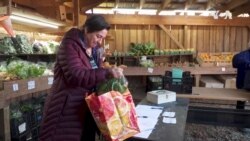((TITLE)) COMMUNITY SUPPORTED FARMING
((TRT: 05:48))
((Reporter/Camera/Editor: Jeff Swicord))
((Map: Washington, D.C.))
((Main characters: 1 female; 0 male))
((Sub characters: 3 female; 0 male))
((Blurb: Community supported farms are growing in popularity across the US. Rather than depending on banks to fund their operations they sell shares to their customers who are paid back with fresh food throughout the season.))
((MUSIC/NATS))
((Hana Newcomb
Potomac Vegetable Farms))
I am a second-generation farmer. My parents started this farm in 1962. My father started out not as a farmer but as a government economist, and he decided to be a farmer when he was in his late twenties. And they started out with sweet corn because he thought that that's what the world needed, was fresh sweet corn.
The land that we are sitting on right now, they bought in 1966. I actually am somebody who has never missed a single summer on the farm. I love growing vegetables because it's the one thing that seems like will never go out of style. Everything else that's a food seems to be under some health questions, but vegetables are completely uniquely healthy.
((MUSIC/NATS))
This is the cool view. What did I do with my knife? Here we go.
((Hana Newcomb
Potomac Vegetable Farms))
How hard is it to get land and start a farm? It takes more than most people have. More like 60 years ago, Fairfax County was transitioning from being dairy farms to being suburbs. That development there was the Front field. And if you go further, that's the Thompson field. And if you go across the street, that's the Whiteman field. And if you go over there, that's Bradley Thompson's. And so, all of these are old farmers from 50 years ago or 60 years ago, who rented us property all along this road, all the way to Tysons Corner.
((NATS/MUSIC))
((Hana Newcomb
Potomac Vegetable Farms))
And so, when my parents bought this piece of property, there were no suburban developments around here. It was a two-lane highway, Route Seven, which is now currently a six-lane highway,
and all the old dairy farmers were sitting on their property waiting to sell it and waiting to make a lot of money. If you can believe this, the land that was sold adjacent to our property in 2008, was $500,000 an acre undeveloped, an insane amount of money to have to spend, to come up with, to grow vegetables.
((NATS/MUSIC))
((Hana Newcomb
Potomac Vegetable Farms))
What’s the solution? What the populace needs to do is say that farming is important to them, and that it is just as important as park land or other public amenities that people really enjoy living near. And this is a big step toward keeping agriculture going in a metropolitan area.
((NATS/MUSIC))
((Hana Newcomb
Potomac Vegetable Farms))
Farming basically means at the end of the year, hopefully, you paid all your bills. But that doesn't mean you have any money left to start the next season unless you happen to have such a good season.
CSA [Community Supported Agriculture] is a great fit for our farm. I think I have about 600 CSA members.
((NATS))
Happy to be here. We’re so blessed, yes.
((Hana Newcomb
Potomac Vegetable Farms))
My father used to borrow $25,000 at the beginning of the season and pay it back to the bank in September. Instead of that, now we ask our customers if we can borrow that money, and they give it to us in February and willingly, and then we pay them back in vegetables through the season. They have three different size shares: mini, regular, and robust. If you're a mini share, you get six, and you just come and pick out whatever six things you want. And if you decide you want six bags of tomatoes, you get six bags of tomatoes.
((Chris Toye
CSA Member))
Oh my gosh, the produce is so fresher, has better flavor. It just… and you get to pick and choose what you want to use. It is just wonderful.
((Hana Newcomb
Potomac Vegetable Farms))
When you do something the same for 20 years or 15 years or ten years, and you keep coming once a week to somebody's house every week, they're going to get to be like family.
((NATS))
Bye!
((Hana Newcomb
Potomac Vegetable Farms))
So, the farmer's market part of our business is roughly 40%. So, we're very dependent on it.
((NATS))
We do have some spinach in the back corner there.
((Hana Newcomb
Potomac Vegetable Farms))
We go to five markets a week for 30 weeks of the year, and one of them we go year-round. 20 weeks the year that we don't have a market really. So, we make a lot of…as much money as we can in those 30 weeks.
((NATS))
Thank you so much and there is your five dollars.
((NATS/MUSIC))
I think the end closest to the stand is where it's a little bit biggest now.
((Hana Newcomb
Potomac Vegetable Farms))
I do not think I'm the last generation to farm this land because I have my nephews who are how much younger than I am. They're 30 years younger than I am. And then we have Kerry, who is one of the co-owners, and she's 20 years younger than I am.
((NATS))
This is supposed to be the size of a ping pong ball.
((Hana Newcomb
Potomac Vegetable Farms))
I think the land will stay because my siblings and my, the next generation down, have unanimously agreed that we will not sell the land. I don't think that people should be so fearful all the time about change. I think that there's opportunity all the time for change to be good. And that's why you have children. That's why you raise people to be better people. It’s because you want the opportunities to come up.
((NATS))











